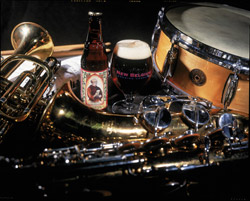 Yesterday I wrote: “and I’m sure that news stories and tributes will appear soon enough elsewhere on the Internet.”
Yesterday I wrote: “and I’m sure that news stories and tributes will appear soon enough elsewhere on the Internet.”
Only a bit of an understatement. I have no idea how many billion kilobytes went winging about the Internet yesterday – in blogs, on discussion boards, via e-mail – in which people shared their memories and paid tribute to Michael Jackson. I was going to compile a list of links, to make sure you didn’t miss the best, but it grew far too long. (Head to really simple BEER syndication to be overwhelmed.)
Instead a story as promised, mostly in Michael’s own words, that made me almost smile yesterday.
When he kept his Beer Hunter website active one of my jobs was to add his updates (edit him? silly thought). Sometimes he would send other stories just to amuse me, ones that might or might not make it into print elsewhere. One mentioned the secret pleasures of working for a morning newspaper, putting the paper to bed and heading for the pub having already seen the next day’s news.
The exchange that followed digressed a bit:
“When I was 17 or 18, I worked as a sub-editor (rewrite?) on a small town afternoon paper, The Huddersfield Examiner, in Yorkshire. Being a daily, it followed the usual practice of mixing local stories by its own reporters with national and world news from AP, Reuter, etc. Given the short time available to distribute an afternoon daily, it did not go much beyond the city limits. After publication each day all the national and world stories were dissed, but the local items were kept in metal galleys. They were re-composed on Friday into a weekly paper for the surrounding countryside. So Friday was a long day: first the usual afternoon paper, then the weekly. In stories with the word ‘today’ that had to be replaced by ‘this week’ and everything had to be cut and fitted to new layouts,with new headlines. The chief sub-editor would urge me on: ‘Hurry, lad, you (ie the paper) will miss the milk train’ (which dropped off the bundles at village stations as it headed off towards Manchester in the early hours).
“After that, we walked through the Linotype room, past metal ‘stones’ full of page formes, exuding the smell of hot metal and oil. The building was already rumbling to the roll of the presses. At the far end of the room, a door led directly into the pub, The Prince Albert.”
Later I described the back shop of the first paper I worked at, that the floors were cobblestone and sometimes when a printer would get an assembled page rolling too fast and it would hit a bump and go flying. Metal type went everywhere, but had to somehow be reassembled.
Had we been in a pub we would have laughed mightily and ordered another pint.
A few days later an e-mail arrived about a post he wanted to amend:
“I’m sending you a slight revision in the next half hour. Don’t slip on the cobbles and drop it.
“A compositor at the Huddersfield Examiner once pied the splash story, on deadline for the first edition. Picking himself up, he calmly slid a suspiciously-dusty galley from a drawer. ‘We’ll pop this in for the first edition,’ he reassured me. On taking a look, I saw that it was a story announcing the discovery of Tutankhamen’s tomb. It had been in the drawer since the 1930s. I pointed out that it was old news, by several decades. ‘Aye, but it fits,’ he grunted, stretching a length of his apron alongside the galley to gauge its length.
“I had better stop these reminiscences before I turn into Mark Twain.”
 What do jazz musicians drink?
What do jazz musicians drink? Yesterday I wrote: “and I’m sure that news stories and tributes will appear soon enough elsewhere on the Internet.”
Yesterday I wrote: “and I’m sure that news stories and tributes will appear soon enough elsewhere on the Internet.” Just when you thought it was safe to go into the style pool again . . .
Just when you thought it was safe to go into the style pool again . . .